Responsibilities of relevant government bodies are specified in May 1 regulation. Yang Zekun reports.
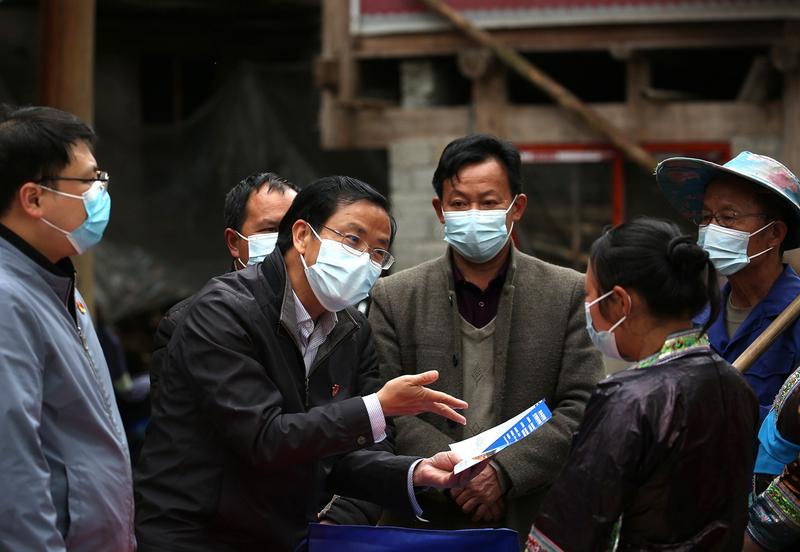 Members of a discipline inspection and supervision team visit a village in Rongshui Miao autonomous county, Guangxi Zhuang autonomous region, in March to learn how policies related to agricultural production are being implemented. (HUANG XIAOBANG / XINHUA)
Members of a discipline inspection and supervision team visit a village in Rongshui Miao autonomous county, Guangxi Zhuang autonomous region, in March to learn how policies related to agricultural production are being implemented. (HUANG XIAOBANG / XINHUA)
No organization or individual may retaliate against people lodging petitions, according to new regulations. Moreover, the work of dealing with public complaints or proposals will be assessed annually as a reference point for the performance evaluations of officials and government departments.
Issued by the Central Committee of the Communist Party of China and the State Council, the regulations on dealing with petitions and handling public complaints or proposals aim to place the processes under better rule of law, standardize the execution of such work and focus on the prevention of problems or on solving those that already exist at the source.
The document incorporated the contents of the regulations on public complaints and proposals issued by the State Council, China's Cabinet, in 2005. The revised version contains six chapters and 50 articles that give detailed descriptions of all aspects of the procedures employed in handling complaints and reporting proposals.
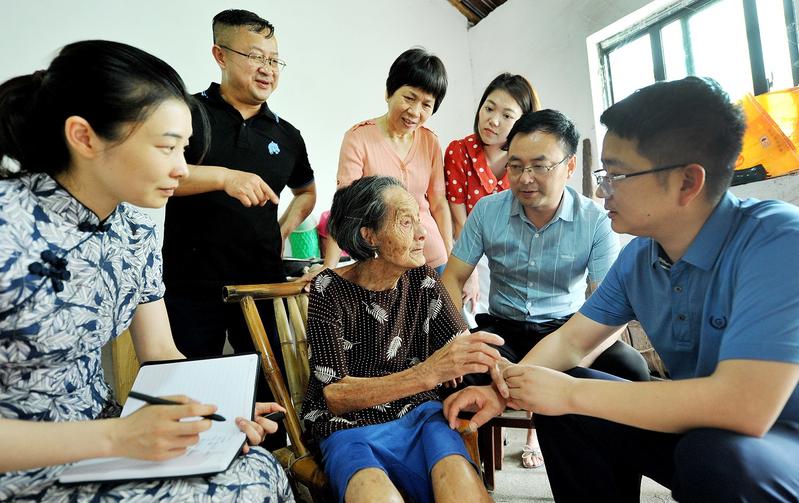 Petition office workers visit a senior who has no family in Shangrao, Jiangxi province. (ZHUO ZHONGWEI / FOR CHINA DAILY)
Petition office workers visit a senior who has no family in Shangrao, Jiangxi province. (ZHUO ZHONGWEI / FOR CHINA DAILY)
The regulations, which took effect on May 1, said leading cadres and staff members at the relevant authorities will be severely punished if they treat complaints in a negligent manner, act peremptorily or arbitrarily, seek personal gain while dealing with such cases, handle large personal visits ineffectively or allow negative public opinion to cause the situation to escalate.
Officials will be punished if they disclose the details of complaints or information to the subject of the report, retaliate against petitioners or conceal, falsely report or delay the reporting of major or urgent complaints that may have a social impact.
In the new era, there are many challenges, new situations and issues facing those who handle petitions.
That means the government must actively adapt to changing circumstances and the requirements of the work, and improve the system by which complaints are handled, according to an official with the National Public Complaints and Proposals Administration.
Such work is an important way for government departments to understand social conditions and gauge public opinion.
The new regulations aim to build a channel that will allow the public to levy criticisms, suggestions and complaints, and will connect the government and the people, which will further deepen people's trust in the government, the official said.
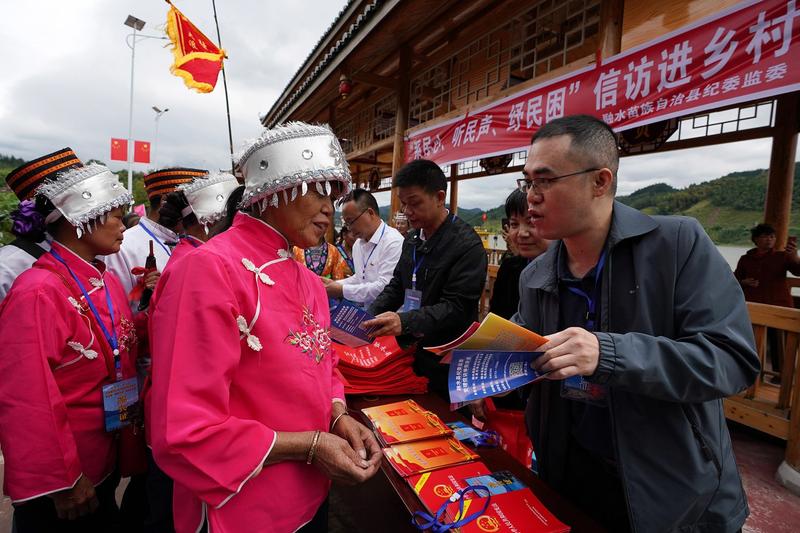 Residents ask for help from petition officials in the village in Rongshui county. (LONG ZHILIN / FOR CHINA DAILY)
Residents ask for help from petition officials in the village in Rongshui county. (LONG ZHILIN / FOR CHINA DAILY)
Supervision mechanism
The regulations will also allow a system to be established to oversee the work of handling complaints, including supervision responsibilities, a supervision mechanism and accountability.
Complicated problems that are the focus of complaints will be included in the scope of supervision, while the regulations have also strengthened the evaluation of the work to deal with complaints.
The regulations apply to the reporting of complaints at authorities at all levels, including bodies related to the CPC, all people's congresses, the Chinese People's Political Consultative Conference, courts, procuratorates, State-owned enterprises and public institutions, as well as supervisory and administrative bodies.
Citizens and legal entities can put forward suggestions or complaints to the authorities at various levels through information networks, letters, telephone calls, faxes or personal visits, and the relevant authorities will handle the cases in accordance with the law and regulations.
The relevant authorities at all levels will publicly disclose the channels, mailing addresses and telephone numbers for consultations and complaints, the time and place to report complaints and the correct way to inquire about their progress, according to the regulations.
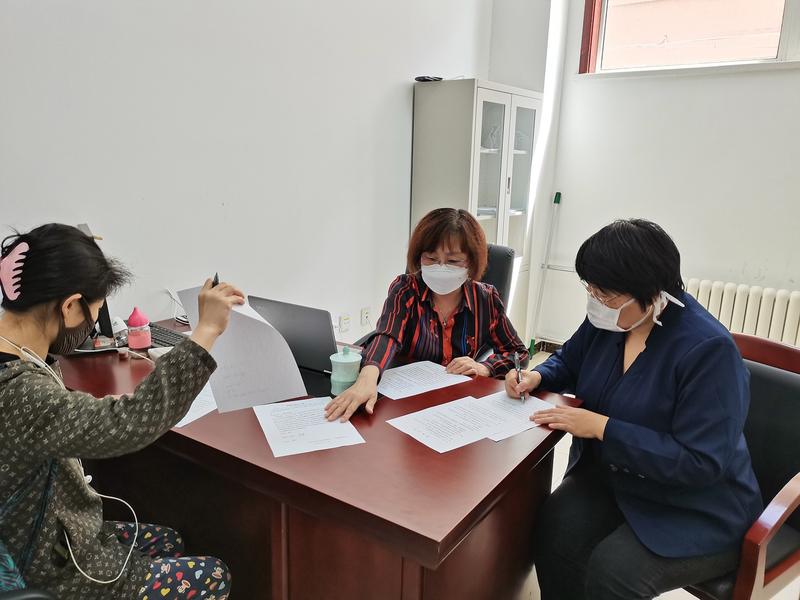 A petition official (center) helps deal with issues between residents in Tianjin. (PHOTO / XINHUA)
A petition official (center) helps deal with issues between residents in Tianjin. (PHOTO / XINHUA)
They note that leading cadres at the authorities should read and handle letters and online petitions from the general public, regularly receive public visits and visit the people to resolve problems that are of major concern to members of the public.
The relevant authorities must inform the petitioner in writing of the status of the issues reported within 15 days of the date of receipt, and complaints must be resolved within 60 days of the date of acceptance.
If the circumstances are complicated, the time limit can be extended by up to 30 days with the approval of the person in charge of the relevant government department, and the complainant must be informed of the reasons for the delay.
Petitioners should present their thoughts objectively and truthfully, and be responsible for the authenticity of the materials provided. Those who want to present an issue via a personal visit should go to designated reception sites established by the authorities. No more than five representatives can be elected to report complaints when the matter involves the interests of multiple people.
The authorities handling the complaint must not disclose or transfer materials or relevant information to the subject of the complaint. Moreover, hearings may be held for complaints that are deemed major, complicated or difficult.
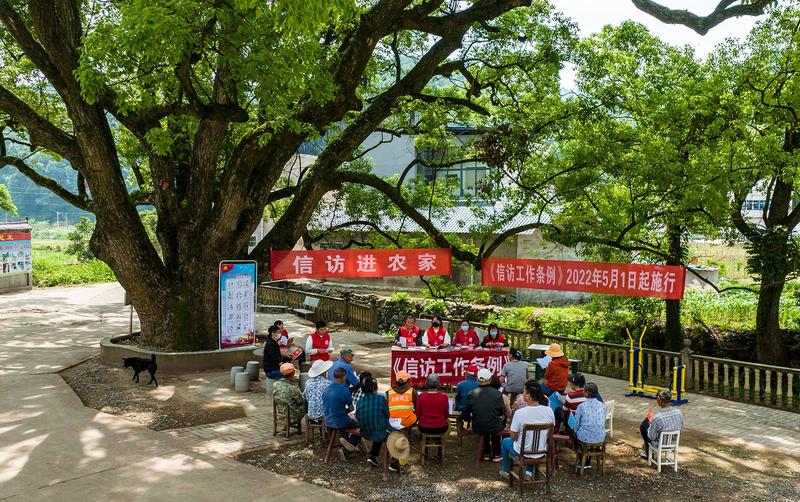 Members of a discipline inspection and supervision and petition team introduce regulations related to complaint-resolution work in a village in Ruichang, Jiangxi. (WEI DONGSHENG / XINHUA)
Members of a discipline inspection and supervision and petition team introduce regulations related to complaint-resolution work in a village in Ruichang, Jiangxi. (WEI DONGSHENG / XINHUA)
Problem solved
For example, a case settled via a public hearing by the Bao'an District People's Procuratorate in Shenzhen, Guangdong province, involved a local company that emitted industrial waste gases during the production of enameled round copper wire.
The business is located on industrial land. However, the planning regulations for an area of land 110 meters from the factory were changed in 2014, which led to the construction of residential buildings.
In 2019, as residents moved in, they began to complain to the local environmental protection bureau about waste gas emissions. They lodged petitions with the relevant departments more than 1,000 times, and several mass disturbances occurred.
After a tip from the public, the procuratorate found that administrative inaction by the environmental bureau may have infringed on social and public interests, so it registered a case in October 2020.
After investigation, the procuratorate found that the bureau had failed to detect and stop the company from shutting down its waste gas treatment equipment without authorization. As the case involved a large number of people and concerned the local living environment, the procuratorate organized a public hearing in November 2020.
During the three-hour hearing, the responsibilities of local government environmental bodies were clarified, and the best solutions were discussed to ensure the quality of residents' lives and the normal operations of businesses.
After the meeting, the company agreed to fully reopen its waste gas treatment equipment and formulate a plan to relocate the factory.
Most of the company's machinery has now been moved to new locations, and representatives of the people who had repeatedly complained about the issue to the relevant authorities have signed an agreement promising not to lodge further petitions related to the issue.
Last year, procuratorial bodies nationwide received 895,000 petitions from members of the public, a decline of 1.2 percent year-on-year, according to the Supreme People's Procuratorate, the highest related body.
Contact the writer at yangzekun@chinadaily.com.cn


